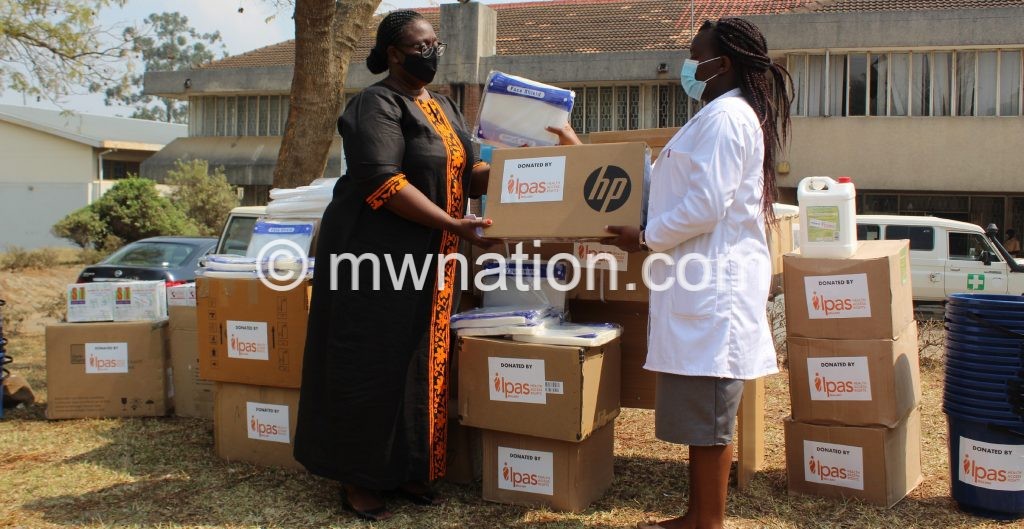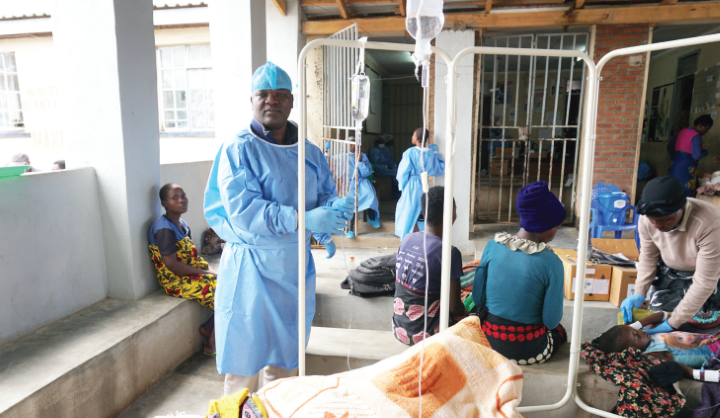Covid tests Nairobi promise
The coronavirus pandemic offers a litmus test for Malawi’s resolve to put sexual and reproductive health (SRH) at the centre of emergency relief.
Last November, the government pledged to ensure all humanitarian responses include SRH services and information by 2030.

Ten months on, however, health workers keep receiving boxes of soap, buckets, face masks, hand sanitisers and other personal protection kits, with not much for reducing unintended pregnancies, backstreet abortions and sexually transmitted infections (STIs), including HIV.
“So far, only Ipas has given us SRH assistance. Prior to this, I’ve never heard of anything like this. However, the need is rising as teen pregnancies are increasing,” said senior medical officer Dr Hope Tambala after receiving the donation worth K8.1 million at Blantyre District Health Office.
This brings into question the promise ex-minister of Health Jappie Mhango made at the International Conference on Population and Development (ICPD) in Kenya.
Campaigner Maziko Matemba, who attended the Nairobi summit, says Covid-19 presents an early test to the ICPD pledges.
“So far, we haven’t done well on the commitments made just a month before the coronavirus outbreak started. Instead, we have gone down. We didn’t integrate SRH issues in the national Covid-19 response, but this was supposed to be one of the big issues,” he explains.
A silent crisis
Matemba says the surging teen pregnancies following school closure masks a graver crisis.
He says: “Most people are talking about pregnancies, but not the effects of unprotected sex. Some girls won’t return to school because they will be nursing babies.
“Expect STIs and backstreet abortions to shoot. Many girls will live to regret. We need to bring SRH services closer to young people.”
All regions have confirmed a sudden rise in teen pregnancy since schools closed in March.
Dalitsolanga Mang’anda, who coordinates treatment of complications of backstreet abortions, says: “We are seeing more and more girls who have aborted and we treat them to avoid infections that may result in removal of their uteruses.”
“While attending to them, we find sticks, wires and toxic herbs tucked in their cervices.”
All health centres in Blantyre, except Bangwe and Ndirande, do not provide post-abortion care due to lack of skilled hands and equipment.
Every month, they clean wombs of over 160 women and girls who terminate pregnancies within 13 weeks from conception.
The tools they find in a woman’s birth canal shows how far she will go to terminate pregnancy despite the country’s colonial ban on abortion unless her life is in grave danger.
Unsafe abortion
A study by the College of Medicine’s Centre for Reproductive Health and US-based Guttimacher Institute shows 141 000 abortions occurred in 2015.
“Neither the law nor religious norms have stopped women from seeking abortion. However, we need to relax our laws to increase access to safe abortion because we are paying a huge cost on post-abortion care,” says lead researcher Dr Chisale Mhango.
The findings show that 60 percent of women who aborted received treatment for various complications.
Mang’anda paints a depressing picture: “They come to us bleeding. During the MVA, a procedure to clean their wombs, we discover horrible things they use to clandestinely terminate pregnancy,” she says.
Health centres in Blantyre refer patients with life-threatening complications to Queen Elizabeth Central Hospital (QECH).
“The problem is big. Every day, Ndirande sees three people seeking post-abortion care. The district records over 160 a month requiring MVAs,” Mang’anda says this could be just a quarter of the burden of unsafe abortions as the majority fear to seek treatment.
“Many come in a critical condition, but only one in four women who terminate pregnancy seeks treatment. Most of them suffer in silence at home.”
Pansi Katenga, Ipas country manager for Malawi, says the ICPD promise is important as women and girls bear the brunt of the Covid-19 crisis.
She states: “It is definitely a matter of concern. We know that most of the people who have fallen pregnant are schoolgirls who may want to go back when classes resume. So, we are expecting an increase in efforts to secretly terminate pregnancies.
“Already, we are hearing of an increase in women going to QECH to seek post-abortion care. It is a crisis upon a crisis; As we are dealing with the pandemic, we also have to deal with the complications of unsafely terminating pregnancies and go to hospitals to seek medical care.”
‘The problem is here’
In 2012, the government triggered the review of abortion laws, but the process opposed by some faith groups has stagnated since 2015 when the Law Commission published proposed grounds for safe abortion.
Mang’anda wishes the process was back on track.
“The problem is here and we have to address it,” she says. “The government is spending billions treating abortion complications, but we can use the money for other critical services.” n





